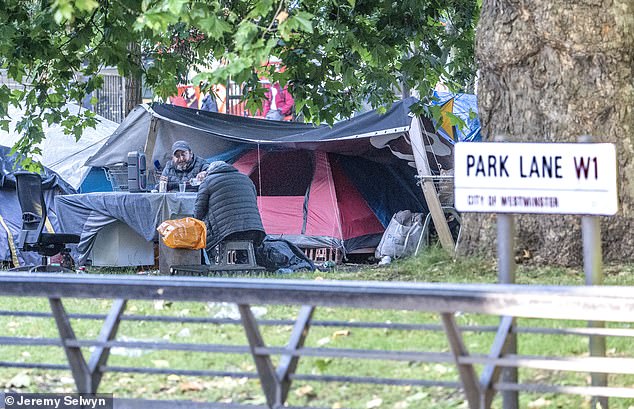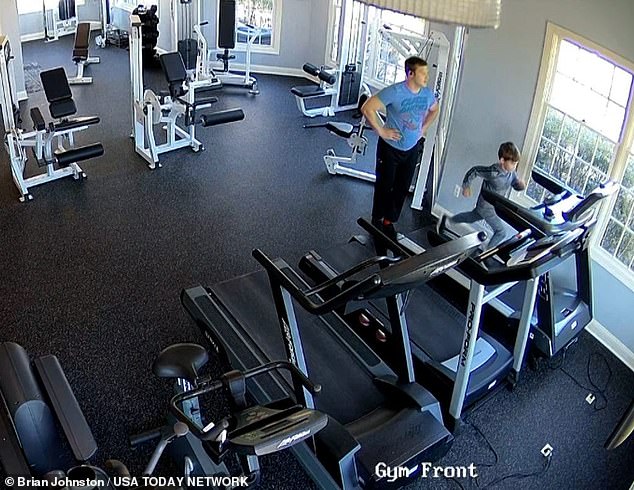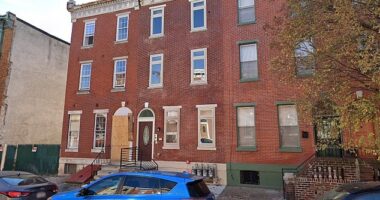Park Lane is London’s aorta. It is one of the capital’s most famous roads and the dual carriageway that separates Hyde Park to the west from Mayfair to the east. An assortment of dukes as well as former Prime Minister Benjamin Disraeli and various tycoons have lived here.
But now it is home to other, quite different, dwellings and residents.
A conglomeration of ten migrant tents grouped together have been established on its central grass verge by Marble Arch. This section of Park Lane has now also become a panorama of shopping trolleys and tarpaulin, often tied together to provide shelter from the sun and the rain. Water bottles, shoes, clothes and wooden crates and pallets in various stages of decay and dismantlement are scattered throughout the area.

This section of Park Lane has now also become a panorama of shopping trolleys and tarpaulin, often tied together to provide shelter from the sun and the rain

Altavista, a cheerful woman dressed in a black T-shirt and black tracksuit bottoms, is cooking food for everyone

David visits the camp in the heart of London and talks to some of the inhabitants about why they are there
Around 17 migrants live here. The tents are, like those in many migrant encampments I’ve seen from Calais to the Greek island Lesbos, large, robust and uniform, which can only mean one thing: that they have been provided for the people there, almost certainly by charities.
The camp sits almost opposite one of the world’s most famous hotels, the Dorchester. Queen Elizabeth II stayed there the night before her engagement to Prince Philip. Of far less note, my parents began their honeymoon there decades ago.
I approach the tent nearest the road. Inside, a woman in her 50s is sitting smoking. Her name is Cristina, and she has been in the UK for several years, in Park Lane for six months. What she wants is to work, she says, but without the right documents she cannot get it: so she has nowhere to go but here. ‘I have no choice,’ she says resignedly.
To my right is the Park Lane street sign. Here the average house price on the road is £40 million. Absurdly expensive sports cars whizz by.
A man called Baros wanders over. He smiles. Clearly, life has taken its toll: his teeth are like a depleted picket fence, his face has been battered by wind and alcohol. He, too, tells me he only wants to work, but it’s not possible, so here he is.
So far, the official response to all this has consisted of evasion and buck-passing. Westminster City Council says it spends £7million a year to help those who are rough sleeping. But so far it has not cleared the site. It says the camp is on land that is managed by TfL so it needs to wait for them to act.
In the meantime, the well-to-do local residents are getting angry. John Caudwell, former boss of Phones 4U, lives locally in a multi-million-pound house and told MailOnline: ‘What must tourists think when they see this? They get onto their open top buses to see Buckingham Palace, Big Ben and other sights. And then they come to Park Lane and see this.
‘How are they allowed to just live here? It’s disgraceful. They have been here for months, and the council does nothing. It’s outrageous that they have been allowed to pitch here in the first place.’

Vasil says: ‘I did every rubbish job I could take. I don’t mind living on the streets. I don’t mind begging, though I would never steal’

Westminster City Council says it spends £7million a year to help those who are rough sleeping

Rather than move the migrants on, Westminster City Council commissions charity partners to provide outreach teams that offer support to people sleeping rough
He added: ‘Do you know how much I pay in council tax? And what does Westminster Council do?’
Rather than move the migrants on, Westminster City Council commissions charity partners to provide outreach teams that offer support to people sleeping rough. ‘Known gathering places are visited frequently,’ says a spokesperson.
Cristina confirms this. In broken English, she tells me that the council come round almost every day, she adds. What do they give you? I ask. ‘Nothing,’ she replies. ‘Only their time.’
Like all tent encampments there is a routine; Altavista, a cheerful woman dressed in a black T-shirt and black tracksuit bottoms, is cooking food for everyone.
An upturned plank of black hoarding is used as a table on top of which are a pile of peeled potatoes and a plate of red peppers and lettuce. The produce looks edible. Her English language skills are almost non-existent: she asks for money, but I have no cash. But we smile at each other, and she allows us to take her photo.
I wander across to where a man is lying half asleep on a blanket some 30 yards from the main camp. He introduces himself as Civi. He came here by plane from Romania with his friend Vasil. ‘My country is very bad,’ he tells me. ‘I need to work somewhere. He has had many jobs, he tells me, including being a picker for Tesco at £8.07 per hour.
Do you like England? I ask him. ‘Of course,’ he replies. Why? ‘The people are good.’ He asks me for £5 for food, and then, when I explain my lack of any change, he says: ‘I am hungry.’ I go to a nearby Sainsbury’s and buy him two sandwiches, a bottle of water and a Coke.
When I return, passing the main encampment where everyone is eating Altivista’s food, I speak to Vasil. He asks me if I can transfer money to his Revolut account so he can buy a ticket back to Romania. He has been here since 2017. ‘I need work documents,’ he says. ‘I don’t want residency, just the right to work. That’s all.’ He has three children back home and he needs to support them.
He continues. ‘I did every rubbish job I could take. I don’t mind living on the streets. I don’t mind begging, though I would never steal, what I mind is my children calling me and asking for things which I cannot give them.’
He tells me that in Romania the maximum he can earn is £900 a month, whereas in the UK if he works he can earn between £2,000-3,000 per month.
But the point is that he can’t. So he is condemned to sleeping rough and begging for food, while the local residents are enraged, and the council fails in its duties.
Everybody loses.
My career as a war correspondent has given me a long and granular experience of migrant camps – of the flow of the most unfortunate of humanity, refugees displaced by that most perennial of historical forces: war. But these people are not refugees, they are, as they admit, economic migrants.
I am the child of immigrants myself. Immigration is vital to the economic and social well-being of this country, especially as the population ages.
But we must be mindful of the immigrants we take in. We need those with skills that we lack; those who can make a positive impact.
What we absolutely cannot do is allow unskilled people to come to this country, then deny them the right to work, which means that the only result for them is life on the streets. Vasil was desperate to go home. But he can’t. So now he begs for food on Britain’s most exclusive street.

The luxury of the nearby Dorchester hotel contrasts sharply with the tent city’s squalor
It is cruel.
And what makes the situation so frustrating is that it is a cycle that doesn’t seem to end. In 2021 another encampment sprung up here. It took an astonishing two years to tear it down.
After it was finally done, Conservative Councillor Rachael Robathan claimed that it required a 16-ton compactor and a crew of cleaners to deal with the scale of debris left.
That camp had been preceded by others – residents had been complaining about gaggles of people setting up home on the grass for around seven years.
People are now taking to social media to vent their frustration and anger. Recently a passer-by took a photo of the camp and posted it online, railing at Westminster City Council. ‘What are Westminster City Council doing about this illegal immigrant refugee camp in the middle of Park Lane W1?’ he wrote. ‘Simply appalling. #Ghetto’.
I want to be clear: I don’t blame the migrants, who are here seeking a better life. I blame the authorities for failing either to arrange for them to go back to their country or to find them adequate places to sleep. This means that the authorities are also failing the people who live and work in this exclusive neighbourhood.
But most of all I blame those at the very highest levels of political decision-making who allowed them to come in the first place, when it was clear this was almost certainly always going to be the result.
The migrants I met were not crafty or malicious; they were not gang members. Indeed, they were so downtrodden and hapless that, if anything, they are likely to be those exploited by organised criminal gangs.
And there is no doubt exploitation takes place — in 2020 it was reported that criminal gangs smuggling people to the UK had set up two tents near a school elsewhere in Westminster, which served as a makeshift brothel where parents taking children to and from the school were being offered sex.
There is no getting around the fact that these Park Lane migrants should not be here.
This is why, when Keir Starmer says that the scheme to forcibly deport those arriving via small boats in the Channel to Rwanda was ‘dead and buried before it started’ and that it has ‘never been a deterrent’, it is imperative that he lays out a clear plan of how the problem will now be dealt with.
What will deter those who want to come but have no hope, often through no fault of their own, of filling the skills gaps we need, of adding real value? Until we face this head on, which requires that trait most lacking in politicians — courage — the problem will only grow.
Dusk sets in and I leave the camp. As I walk toward Marble Arch Tube, I think about the games of Monopoly I would play as a child. Park Lane was always the street that, along with Mayfair, everyone most coveted.
I still remember their rich blue colour on the board. Decades later, the picture in real life is very different. No one is passing Go. No one is collecting £200.
Instead, it seems that everyone, from the residents to the migrants to the British people, is condemned to endless and futile circles around the board, month after month, year after year, with no end in sight.









